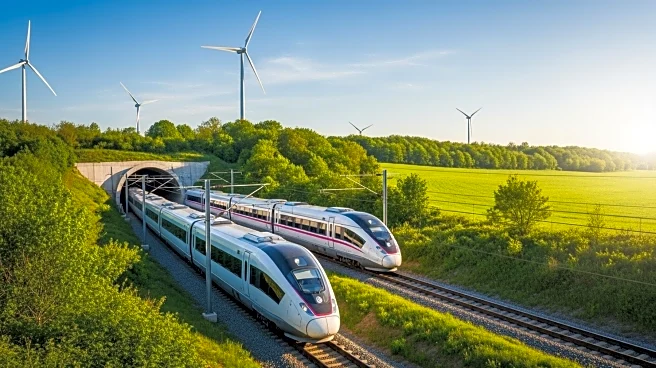What is the story about?
What's Happening?
Eurostar is advocating for governmental intervention to address what it perceives as an unfair competitive advantage held by airlines over rail transport. According to François Le Doze, Chief Commercial Officer of Eurostar, airlines benefit from tax exemptions on aviation fuel, while railways face high track-access charges. This disparity, Eurostar argues, undermines efforts to reduce transport emissions, despite rail's significantly lower carbon footprint compared to short-haul flights. The call for action comes as some European governments are beginning to restrict short-haul flights and invest in rail infrastructure. Eurostar highlights the need for a level playing field to promote rail as a sustainable and convenient alternative to air travel.
Why It's Important?
The issue raised by Eurostar is significant in the context of global efforts to combat climate change. Rail transport is recognized for its lower carbon emissions compared to air travel, making it a crucial component in reducing overall transport emissions. By addressing the competitive imbalance, governments could incentivize more sustainable travel choices among consumers. This could lead to increased investment in rail infrastructure and a shift in public perception towards rail as a viable alternative to flying. The potential policy changes could impact the aviation industry, which may face increased operational costs if fuel tax exemptions are removed.
What's Next?
If governments heed Eurostar's call, potential policy changes could include the introduction of fuel taxes for airlines and reduced track-access charges for rail operators. Such measures would likely prompt a reevaluation of pricing strategies within the aviation industry and could lead to increased investment in rail infrastructure. Stakeholders in the transport sector, including airlines and rail companies, will be closely monitoring any regulatory developments. Public and political support for sustainable transport solutions may also influence the pace and scope of these changes.
Beyond the Headlines
The debate over transport emissions and competitive fairness touches on broader ethical and environmental considerations. It raises questions about the responsibility of industries to contribute to climate goals and the role of government in facilitating sustainable practices. Long-term, a shift towards rail could lead to cultural changes in travel habits, with potential benefits for urban planning and reduced congestion in air travel hubs.
















